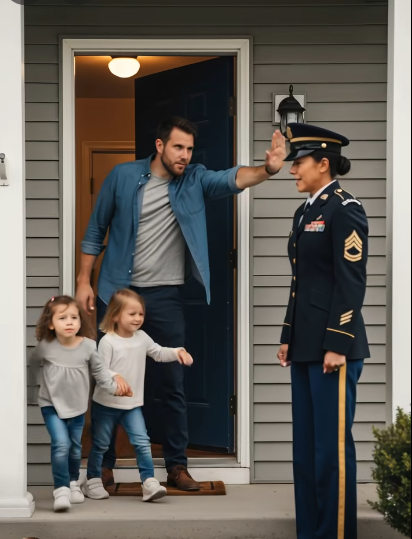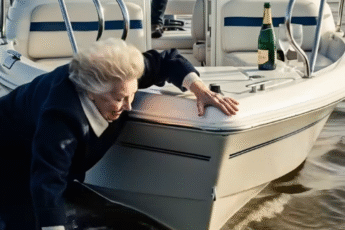I stood at the airport arrivals gate in my dress uniform, medals gleaming, duffel bags slung over my shoulder. Three tours. Thirty-six months away from home, away from everything that mattered. The Memphis International Airport buzzed with the chaotic, vibrant energy of civilian life around me, but I might as well have been standing in a combat zone when I read the text on my phone.
Don’t bother coming. The locks are changed. The kids don’t want you. It’s over.
My husband, Derek, had sent it exactly three minutes before my plane landed. Three minutes. After three years of serving our country, of sleeping on cots in the Afghan dust and dreaming of my own bed, he couldn’t even wait for me to touch American soil before destroying my world.
A woman bumped into me, apologizing profusely before her eyes widened at my uniform. “Thank you for your service,” she said, her own eyes filling with tears.
I could only nod, unable to speak. How do you tell a stranger that while you were out protecting their freedom, your own family was being systematically dismantled, your home turned into enemy territory? I typed back three words that would become my new mission objective.
As you wish.
What Derek didn’t know was that my grandmother, the Honorable Judge Cordelia Nash, had taught me something crucial before I deployed. We had sat in her study, a room that smelled of old books and justice, surrounded by photos of her forty-year career on the federal bench. She’d pulled out a thick manila folder.
“Always protect yourself legally, sweetheart,” she’d said, her steel-gray eyes serious. “I’ve seen too many soldiers come home to nothing because they trusted the wrong person with everything.”
“Derek would never—” I had started to protest, full of naive faith.
She had held up one weathered hand, stopping me. “The Derek you know today might not be the Derek you meet in three years. War changes everyone, Vera. The ones who leave and the ones who stay behind.”
So, I had signed the papers. A power of attorney with strict limitations. Separate bank accounts for my combat pay. The house, purchased with my VA loan before we married, kept in my name only. A comprehensive family care plan that designated my grandmother as emergency guardian if Derek became unfit or unwilling to care for our children, Maddox and Brinn.
“You’re paranoid, Cordelia,” Derek had laughed when he signed his portions, barely reading them. “Vera and I are solid, right, babe?”
Standing in that airport now, reading his cold dismissal of our fifteen years together, I silently thanked my paranoid grandmother. Because Captain Vera Holloway didn’t just plan supply routes in Afghanistan. She’d planned for this exact moment.
My phone rang. It was Sterling Vaughn, my military lawyer. “Vera, I just got an interesting call from a process server,” he said without preamble. “Seems your husband filed for divorce yesterday, claiming abandonment. He’s also filed for full custody and is demanding alimony. Says you’ve been gone so long you’re unfit to parent.”
“Sterling,” I said, my voice carrying the same calm I’d used when calling in air strikes under fire. “Remember Operation Homefront? The contingency plan we hoped we’d never need? Execute it. All of it. Now.”
“With pleasure, Captain. Where are you?”
“Memphis International. About to catch a cab to my grandmother’s house. Not my house. According to Derek, the locks are changed.”
“He’s about to learn what happens when you change the locks on a house you don’t own,” I could hear the smile in Sterling’s voice. “He has no idea what’s coming, does he?”
“He thinks he ambushed me,” I said, walking toward the exit with renewed purpose, my military bearing returning like a second skin. “But you can’t ambush someone who’s been preparing for your betrayal since the day she left. He wanted a war. He just got one.”
As I stepped into the Tennessee sunshine, my phone buzzed again. Another text from Derek. Also, I’ve been seeing someone. Nadira understands the kids need stability, something you clearly can’t provide.
I screenshotted it, adding it to a digital folder I’d been building for six months, ever since the strange charges started appearing on the joint credit card he didn’t know I still monitored. Three tours of duty had taught me many things. How to survive on two hours of sleep. How to make life-or-death decisions in seconds. But the most important lesson was this: always have a battle plan. And always, always have a backup plan for when the enemy shows their true face.
Three years ago, I had kissed my family goodbye at Fort Campbell. Derek held me tight, whispering promises about keeping the home fires burning. Maddox, eleven then, stood straight and tried to be brave, but his chin quivered. Eight-year-old Brinn clung to my leg, her small fingers twisted in my fatigues, making me promise to FaceTime every single week.
“Mommy’s going to help keep everyone safe,” I’d told them. “And when I come back, we’ll go to Disney World. All four of us.”
The first tour went smoothly. We had a rhythm. Daily emails. Weekend video calls that became our church. Care packages flowed both ways like a lifeline. But by the second tour, things began to shift. The calls got shorter. Derek would position the camera so I could barely see him. “Real estate’s been crazy,” he’d say. “You don’t want to see me anyway, I haven’t shaved in days.”
By the third tour, he often stopped picking up altogether. A text would appear minutes later: Connection’s bad, babe. Kids are at practice. We’ll try tomorrow. Tomorrow never came.
The real warning signs started six months ago, subtle as hairline cracks in armor. Brinn stopped appearing on video calls. “She’s going through a phase,” Derek explained, his eyes darting away from the camera. Maddox, the boy who used to tell me every detail about basketball practice, began answering my questions in monosyllables. “Dad said not to bother you with kid stuff,” he mumbled once. “You have important things to worry about.”
Then came the credit card alerts, popping up on my phone like small explosions. Expensive dinners at restaurants I’d never heard of. A three-thousand-dollar purchase from Cartier. “Business expenses, babe,” Derek had laughed it off, the sound too bright, too forced. “Got to wine and dine clients. The jewelry was an anniversary gift for a client’s wife. It sealed a sixty-thousand-dollar commission.” It sounded plausible, but it felt wrong, like a familiar picture hung slightly crooked.
Two weeks before my return, I called home unexpectedly. A woman answered on the second ring, her voice young and breathy. “Oh, you must be Vera. Derek’s told me so much about you. I’m Nadira. I’m helping with the kids while you’re away.”
My blood turned to ice. “Helping how?”
“You know, just being here for them. Derek says you’ve been gone so long, they needed a maternal figure. Someone consistent.” Her words were coated in false sympathy. “We’re planning Brinn’s birthday dinner. A whole princess theme!” Brinn’s birthday was three months away, and she hadn’t been interested in princesses since she was seven.
I hung up, my grandmother’s voice echoing in my mind from a call two days prior. “Something’s not right, Vera. I drove by your house yesterday. There was a moving truck. A woman’s vanity, a new bedroom set.”
Standing in that airport, all the pieces clicked into place. The “maternal figure,” the moving truck, the distant children, the expensive dinners, the jewelry. Derek hadn’t just moved on. He had orchestrated a complete replacement, turning my children against me while spending my combat pay on another woman. The realization hit harder than any roadside bomb. My husband had executed a perfect ambush, and I’d walked right into it. But he had forgotten one critical piece of intel: I was a logistics officer. And logistics officers don’t just plan for victory. We guarantee it.
I sat on a hard airport bench and made the call that would change everything. “Sterling, it’s Vera Holloway. Time to execute Operation Homefront.”
Sterling Vaughn, my former JAG officer and now my civilian lawyer, was the one person besides my grandmother who knew exactly what documents I’d filed. His voice was sharp and alert. “You still have all the paperwork?” he asked, and I could hear him already moving, his keyboard clicking.
“Every document notarized,” I confirmed, my own voice steady as steel. “Plus the family care plan designating my grandmother as emergency guardian. And Sterling, I’ve been documenting everything for six months. Every missed call, every strange expense. I have screenshots, bank records, credit card statements.”
“How much equity in the house?”
“Four hundred thousand. My VA loan, my name only. Derek’s on the deed as a courtesy, but I never added him to the mortgage.” It was Grandma Cordelia’s idea. She said keeping it separate would protect the children’s future.
“Smart woman,” Sterling whistled. “And the bank accounts?”
“Separate since deployment. I’ve been depositing my combat pay into an account he doesn’t know exists. Eighty thousand saved, including my reenlistment bonus.”
“Vera, you brilliant woman. He’s about to learn what happens when you betray a logistics officer. We plan for every contingency.”
“File an emergency motion, Sterling. I want my kids protected. Freeze everything. Cancel his access to my cards, remove him as beneficiary from my life insurance and pension. And get a forensic accountant on our joint account. Every dime he spent on his girlfriend comes back to me.”
I hung up and immediately called my grandmother. She answered on the first ring. “Cordelia, I need you to go to the house. Document who’s living there.”
“Already ahead of you, sweetheart,” her voice was sharp as a blade. “I’ve been taking photos for weeks. License plates, moving trucks. That woman, Nadira, moved in two months ago. She parks in your spot, Vera. Uses the garden you planted.”
My jaw clenched. That garden had been my connection to home.
“There’s more,” Cordelia continued. “Derek told the school you’d abandoned the family for your career. The kids are in counseling because Brinn cries every day and Maddox got into three fights this month. Boys were calling you a deserter.”
My heart broke clean in half. “Execute Protocol 7, Grandma.”
“With pleasure, Captain.” Protocol 7 was our nuclear option: an emergency custody petition based on parental alienation and psychological abuse. As a retired federal judge, Cordelia could have the papers filed within hours.
“One more thing,” I said, a cold resolve settling over me. “Call Channel 5. Tell them an Iraq and Afghanistan veteran just returned from her third tour to find her husband has stolen her children. Let’s see how Derek handles a public relations war.”
“Vera, that’s brilliant. Nothing like public shame to make a narcissist crumble.”
As I walked toward the taxi stand, my phone buzzed with another text from Derek. Being dramatic won’t help. Just sign the papers when they come.
I smiled, cold and sharp. Derek had no idea what papers were coming his way.
Twenty-four hours later, my phone exploded. Nineteen missed calls from Derek, twelve from his lawyer, forty-three texts ranging from confused to furious to desperate.
What did you do? read the first text at 6 a.m.
The banks say I can’t access anything, came ten minutes later.
This is illegal! You can’t lock me out of my own house! arrived at 7:15. By 8 a.m., the tone had shifted to panic: Vera, we need to talk.
I called his lawyer back from my grandmother’s dining room table, Sterling beside me. Across from us, Maddox and Brinn were eating chocolate chip cookies. My grandmother had picked them up from school with the emergency custody order an hour earlier.
“Counselor,” I said pleasantly. “I believe you’re confused. The accounts I froze are in my name only. As for the house, I sold it to my grandmother for fair market value. Completely legal. As for abandonment, I’ve been serving my country with Derek’s written consent, which he signed.”
Derek’s voice erupted in the background, muffled but screaming. Sterling took the phone. “Mr. Holloway, your client committed parental alienation by telling the children their mother abandoned them while she was on active duty. He also moved his girlfriend into Captain Holloway’s house without consent and misused family support funds meant for the children. Should I continue?”
The line went quiet. His lawyer spoke carefully. “What does Captain Holloway want?”
I took the phone back. “I want my children to know the truth. I want the divorce Derek so kindly initiated via text. And I want him out of my grandmother’s house in seventy-two hours, not thirty days, or I press federal charges for misuse of military family support funds.”
“Mommy,” Brinn’s small voice came from across the table. “Daddy said you didn’t love us anymore. That you chose the army over us.”
I knelt beside her chair, taking her small, trembling hands in mine. “Baby, I chose the army for you. To serve our country, to make you proud. Every single day, I thought of you and Maddox.” I showed her the hundreds of photos of them on my phone, the pictures taped inside my helmet.
Maddox spoke quietly. “Dad made us call Nadira ‘Mom.’ Said you weren’t coming back.”
“But I did come back,” I said, pulling both my children close. “I will always come back. You are my only family.”
Derek’s lawyer’s voice crackled through the phone. “We’ll agree to your terms. All of them.”
Six months later, the divorce was final. Derek got nothing. His girlfriend, Nadira, left him the same day the money ran out, screaming that he was a fraud who had promised her a life of comfort.
Outside the courthouse, he accused me, his face gaunt. “You planned this all along. You knew I’d betray you.”
“No, Derek,” I said, turning to face him one last time. “I hoped you wouldn’t. But I prepared in case you did. That’s what soldiers do. We hope for peace. We prepare for war. I didn’t trick you. I just refused to be your victim.”
That night, I tucked my children into their beds in our new house, smaller than the old one, but ours alone. Maddox had joined JROTC, inspired by my service. Brinn had written a school essay titled “My Mom, My Hero.”
“Mom?” Brinn asked as I turned off her light. “Were you scared? When Dad sent that text?”
I sat on her bed. “No, baby. Because I knew something Daddy didn’t. Soldiers don’t just fight battles overseas. Sometimes the hardest battles are the ones we fight for our families. And I’ve been trained to win.”





